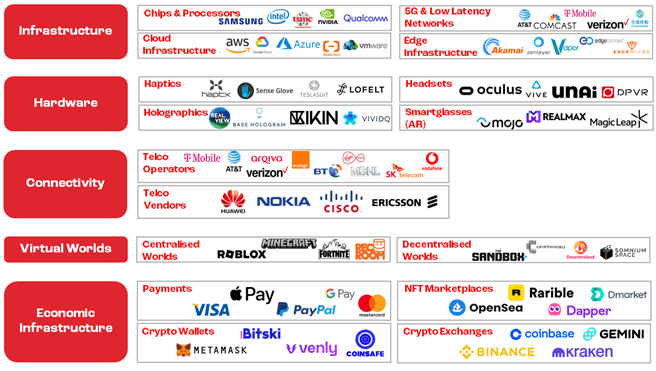Six ways Telcos can leverage the Metaverse

The aspirational and now widely accepted term ‘Metaverse’, refers to a set of interconnected virtual worlds; a new universe which has the potential to bring huge behavioural change and completely transform industry verticals in less than a generation.
Whilst the concept is still in its infancy, it provides a distinct opportunity for telco companies to expand beyond the traditional and trailblaze towards innovation, which bifurcates into two key areas of focus: a new ecosystem to participate in and a new ecosystem to enable. Companies around the globe are already recognising this potential such as Deutsche Telekom (DT) and South Korean telecom (SKT), who have teamed up and collaborated on a new metaverse platform of their own. Ifland is a 5G-based platform that launched in 2021 across 49 countries and now has a user base of almost 13 million. Utilising the popularity of K-Pop, they plan to create joint content with various international partners as well as building out novel communication functions.
Similarly, Meta is now in partnership with Verizon and Telefonica to build testbeds to develop the networking and cloud technology that will glue the metaverse together. Verizon’s focus with Meta is in mobile edge computing (MEC) infrastructure design, “to measure the impact of edge computing on key application performance metrics and evaluate where our network capabilities can enable more powerful metaverse-optimized applications”, quoted Rima Qureshi, Verizon VP. Telefonica are working on an “innovation hub” with meta; a 5G laboratory equipped with “a metaverse end-to-end testbed on Meta and Telefonica’s network infrastructure and equipment”, they have also invited tech start-ups in the metaverse space to participate.
The metaverse needs ubiquitous high-bandwidth, low-latency communication and new equipment to work at scale and will require a flexible and performant foundation to do so. With much of this technology still in research and development stages, the game is wide open for organisations to jockey for an early market position to lead this new world.
Telco operators are uniquely positioned to sit alongside technology giants in the metaverse value chain by harnessing emerging technologies they are already familiar with, such as 5G, cybersecurity, edge cloud and artificial intelligence.
In reviewing the following six areas, organisations will be able to play a truly assertive role in the build of this new virtual world and leverage the power of the metaverse.
1- Become The Leading Connectivity Provider
2- Review Edge Computing Capabilities
3- Prioritise Cybersecurity
4- Harness AI Analytics
5- Create Metaverse Platforms
6- Leverage Ecosystem Partnerships
Layers of the Metaverse

Provide connectivity
Depending on quality, the average virtual reality (VR) Metaverse user requires 5 to 40 times more data than it takes to stream an HD video and Raja Koduri, Senior Vice President and General Manager of the accelerated computing systems and graphics group at Intel states that, “truly persistent and immersive computing, at scale and accessible by billions of humans in real time, will require… a 1,000-times increase in computational efficiency from today’s state of the art”, confirming that delivering ‘metaverse grade’ ubiquitous connectivity will be critical in making the metaverse a thriving ecosystem.
Telco’s energy can be well channelled into becoming the leading connectivity provider and lowering the barriers to entry for consumers, of which, one of the most helpful tools will be 5G. 5G is expected to deliver higher multi-gigabits-per-second (multi-Gbps) peak data speeds, greater reliability, ultralow latency and a more uniformed experience. As 5G networks are commercially deployed, this will help consumers and businesses enter the metaverse.
We are also expecting to witness another upgrade in wireless technology with the arrival of 6G, supported by Nokia CEO, Pekka Lundmark, who said that he fully expects 6G networks to be in operation by 2030, which is predicted to bring full network coverage across land, sea and air. The off-loading of wireless traffic through Wi-Fi 6, the latest generation of Wi-Fi, will also help address network capacity and efficiency related challenges, as well as fibre connectivity increasing high-bandwidth speeds.
Offer edge computing
The computing power necessary to deliver a virtual world will be significant; requiring real-time rendering and AI capabilities to track various objects, characters and environmental effects whilst also adapting the display as these move through virtual space.
Delivering this experience reliably in a single-hosted environment with low latency is challenging and the cloud will not be able to centralise and store all of the necessary resources, but edge computing may well be the solution, becoming another essential cog in the metaverse machine. Edge computing is an IT deployment that puts data and applications as close as possible to the users, delivering a seamless experience by providing the necessary local computing power and minimising network-based latency and congestion risk.
In order to succeed, operators should evaluate and strengthen their partnerships with specialist cloud providers as well as consolidating their own edge cloud and legacy cloud strategies. This will then place them in prime position to provide efficient data transfers, enhance perimeter security, relieve network congestion and diversify their revenue streams.
Prioritise cybersecurity
Metaverse platforms can be susceptible to a host of privacy concerns, data leaks and security threats lurking beyond its virtual doors. Microsoft’s EVP of security, compliance, identity and management, Charlie Bell, urges organisations to prioritise the cybersecurity of the metaverse:
“There must be clear and standard communication around terms of service, security features like where and how encryption is used, vulnerability reporting and updates,” Bell explains. “Transparency helps accelerate adoption — it speeds the learning process for security… We do not need to predict the ultimate impact of the metaverse to recognise and embrace the security and trust principles that make the journey a safer one for all”.
Data security will become increasingly valuable as both business and consumers grow ever more concerned with their digital footprint and integrity of their personal information. Operators hold a unique advantage here, as according to a study by Openet, “Consumers find mobile operators to be trustworthy with their data”.
Assuring all resources can discern and guard against the most fundamental dangers will help reduce long-term hurdles as the need for improved cybersecurity safeguards remains a top priority as technology continues to grow rapidly.
Poised as trusted custodians, operators can leverage their existing customer relationships and establish themselves as identity management experts whilst the metaverse continues to take shape.
Harness AI analytics
As the functional area of analytics and AI converges with the metaverse, telcos will need to pay attention to identity, billing and transaction management. In addition to a concern for customer data management and ownership, telcos will also likely play an assertive role and push far beyond infrastructure enablement. They will have the opportunity to create an analytics and AI layer to support both data management and payment capabilities which will pave the way for new revenue streams and monetisation.
Chatbots are also a great application that telcos may interpret to streamline business processes. These could be used in multiple functions such as providing instructions and information about various products and services, answering questions, completing transactions etc. Moreover, AI can be utilised to create inclusive interfaces that will make the users’ journey more accessible for everyone. With the aid of technologies such as Natural Language Processing, speech recognition, computer vision, translation and augmented reality, users will be able to interact with the metaverse in their native language and through images and videos to enhance their metaverse experience.
Create metaverse platforms
The term ‘metaverse’, currently refers to a collection of virtual worlds in which we can work, play, explore and collaborate in. The belief is that eventually, these platforms will start to combine and ultimately create one, all-encompassing decentralised virtual world; rich in offering, interoperable and governed by the community. In order to take advantage of this gradual evolution, operators could be well placed to create their own platforms, which would aid them in building a deeper understanding of both the demand and necessary technical competencies which would shape the long-term strategy.
Many organisations have already launched their own platforms such as Korean operator SK telco, who unveiled ‘Ifland’ in 2021. The key for other organisations looking to build successful platforms will be to create interesting experiences and events which compel users to spend time on the platform, as well as also ensuring there is capability to offer customised services for business and consumers.
Leverage ecosystem partnerships
Making the metaverse a reality will require significant advancements in multiple areas and no single company or industry can do this alone. Creating the metaverse will require a global effort and by telcos partnering with other expert participants within the metaverse ecosystem, they will be in prime position to drive the new age of the internet forwards and reap the rewards. A key area to consider will be hardware, such as virtual reality (VR) headsets, gloves and glasses. These devices will become increasingly important in acting as a gateway for humans to interact with the metaverse, therefore, operators can look to seize this opportunity by collaborating with device manufacturers and other technology platform providers to drive adoption.
By refining new partnership frameworks, telcos can explore new growth streams such as selling VR devices and connectivity services together, as well as having the capability of offering additional bundles of data packages. There could also be opportunities in strengthening relationships across different industry verticals, exploring different routes together and identifying collaborations. Telco’s should place focus towards long-term partnership strategies across the board to elevate their standings and unlock growth.
Conclusion
The metaverse is a rapidly evolving environment and whilst some prospects may currently be hyped, the rapid acceleration is tangible. In a study conducted by PWC of 1000 businesses, 66% confirmed that they were already “actively engaged”, coupled with a Cap Gemini report that stated 90% of consumers are curious about the metaverse, this new virtual landscape presents a situation and opportunity telco providers cannot afford to ignore.
Communication, computing, storage and analytics infrastructure are core elements of the configuration of the third web, meaning that without the efforts and involvement of telco operators, the creation of the metaverse remains as a sci-fi concept only.
Operators are excellently positioned to harness this exciting opportunity and by investing, innovating, partnering and strategising – they will succeed in fully leveraging the power of the metaverse.
Contact us here to get in touch about any of our services.
Notes:
[1] Consumers find mobile operators to be trustworthy their data report (fiercetelco.com)
[2] What does the metaverse mean for your digital identity (forbes.com)
[3] The metaverse: What’s in it for telcos? | Arthur D. Little (adlittle.com)
[4] THE METAVERSE: WHAT’S IN IT FOR TELCOS? (adlittle.com)
[5] Metaverse survey: Capitalizing on metaverse business opportunities: PwC
[6] Nine in ten consumers are curious about the metaverse – Capgemini UK